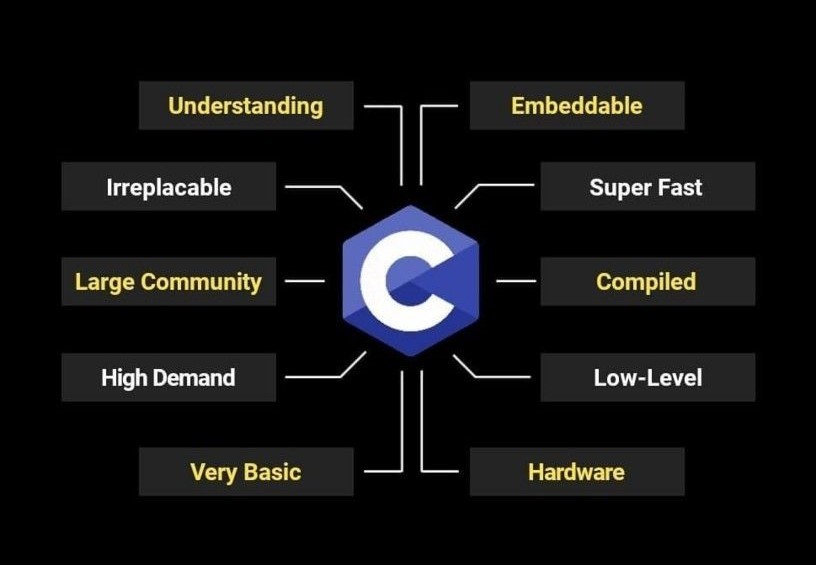
From Zero to Hero: A Comprehensive Guide to Learning C Programming
Are you ready to embark on a journey into the world of programming? If you're looking to start with a language that forms the foundation of many modern programming languages, then learning C programming is a fantastic choice. C is a powerful and versatile language that's been around for decades and continues to be widely used in various applications, from system programming to game development. In this guide, we'll take you from a complete beginner to a proficient C programmer – from zero to hero!
Level 1: Introduction to Programming and Basics
1. Introduction to Programming
- Understand what programming is and how it works.
- Explore the role of programming languages in creating software.
- Learn the importance of algorithms in solving problems.
2. Setting Up Your Environment
- Choose a text editor (e.g., Visual Studio Code, Sublime Text).
- Install a C compiler (e.g., GCC).
3. Your First C Program
- Write a simple "Hello, World!" program to understand the basic structure.
- Compile and run your program.
4. Variables and Data Types
- Define variables and constants.
- Learn about basic data types: int, float, char.
- Explore the sizeof operator to understand memory allocation.
5. Input and Output
- Use scanf to get input from users.
- Use printf to display output to the console.
6. Operators and Expressions
- Learn about arithmetic operators (+, -, *, /, %).
- Explore assignment operators (=, +=, -=, *=, /=).
- Understand comparison operators (==, !=, <, >, <=, >=).
- Discover logical operators (&&, ||, !).
Level 2: Control Structures and Functions
7. Conditional Statements
- Understand if-else statements for decision-making.
- Use nested if-else for more complex conditions.
8. Loops
- Learn about the while loop and its syntax.
- Explore the for loop for iterative tasks.
- Understand the do-while loop and its use cases.
9. Functions
- Define and call functions.
- Learn about function prototypes and header files.
- Explore the concepts of parameters and return values.
Level 3: Memory Management and Pointers
10. Arrays
- Understand arrays and their declaration.
- Learn about one-dimensional and multi-dimensional arrays.
- Perform basic operations on arrays (accessing elements, looping).
11. Pointers
- Introduce pointers and their purpose.
- Understand the concept of memory addresses.
- Learn about pointer arithmetic and its significance.
12. Memory Allocation
- Dive into dynamic memory allocation using malloc and free.
- Understand stack and heap memory allocation.
Level 4: Advanced Data Structures
13. Strings
- Explore the concept of strings in C.
- Use standard library functions for string manipulation.
14. Structures
- Define structures to group related data.
- Learn about structure members and access.
- Explore nested structures and arrays of structures.
15. Unions
- Understand unions and their memory-saving benefits.
- Compare structures and unions.
Level 5: File Handling and Advanced Concepts
16. File Handling
- Learn to open and close files using fopen and fclose.
- Understand reading and writing operations with files.
17. Enumerations and typedef
- Introduce enumerations for user-defined data types.
- Learn how typedef simplifies complex data type names.
18. Preprocessor Directives
- Explore preprocessor directives (#define, #include, #ifdef, etc.).
- Learn how they affect the code before compilation.
19. Bitwise Operators
- Understand bitwise AND, OR, XOR, and shift operators.
- Learn applications of bitwise manipulation.
20. Recursion
- Introduce recursion as a programming technique.
- Understand base cases and recursive calls.
Level 6: Putting It All Together
21. Practice Projects
- Create a simple calculator program.
- Develop a to-do list manager.
- Build a text-based game (e.g., Hangman, Tic-Tac-Toe).
Level 7: Further Learning and Resources
22. Online Tutorials and Courses
- Enroll in online platforms like Codecademy, Coursera, and edX for structured learning.
23. Books
- Explore beginner-friendly books like "C Programming Absolute Beginner's Guide" by Perry and Miller.
24. Practice Platforms
- Engage in coding challenges on platforms like LeetCode, HackerRank, and CodeChef.
Level 8: Community Engagement and Beyond
25. Join Programming Communities
- Participate in online forums, groups, and communities like GitHub and Stack Overflow.
26. Learning More Languages
- Consider learning other programming languages like C++, Python, or Java to broaden your skill set.
Remember, learning C programming is a step-by-step journey. Each concept builds upon the previous one, so take your time to grasp each topic before moving on to the next. With dedication and consistent practice, you'll go from zero to hero in C programming!
Disclaimer⚠️⚠️⚠️: While the step-by-step learning approach outlined in the previous post is a useful personalized method that may align with certain learning preferences, it's important to note that individual learning styles and needs can vary significantly. 💡 As such, it's essential to seek professional guidance or formal educational resources before embarking on your journey to learn C programming or any other subject. 👨🏫 Qualified educators, instructors, or mentors can provide tailored advice to suit your specific learning goals and circumstances, making them valuable sources of knowledge. 📚 While the provided approach can serve as a general guideline, it should be complemented by the input and guidance of experienced educators for a well-rounded and effective learning experience. Therefore, it's always advisable to seek advice from professionals in the field to ensure you're on the right track and making the most of your learning efforts. 🤓
#ProgrammingJourney #CProgrammingCourse #CodingAdventure #LearnToCode #FromZeroToHero #ProgrammingSkills #TechEducation #OnlineLearning #CodingCommunity #TechEnthusiasts #CodingBeginner #SkillDevelopment #CodingBootcamp #ProgrammingLanguages #CodeLikeAPro #CodeWithConfidence #TechJourney #CodingPassion #Programming101 #DigitalSkills #CareerDevelopment